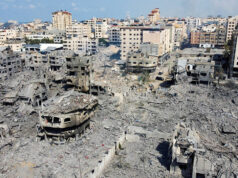Philippine factory activity falls for 5th straight month
FACTORY ACTIVITY dropped for a fifth straight month in July, as manufacturing firms reported weaker production and demand despite relaxed lockdown restrictions.
The IHS Markit Philippines Manufacturing Purchasing Managers’ Index (PMI) slipped to 48.4 last month to indicate a “moderate decline in operating conditions” from June’s 49.7 reading that neared the 50-neutral threshold.
“Despite some positive signs towards recovery in June, the latest PMI data signalled that operating conditions across the Philippines’ manufacturing sector worsened again during July,” IHS Markit said in a press release on Monday.
Operating conditions in the manufacturing sector began deteriorating in March, when the government implemented a strict lockdown in Luzon to curb the spread of coronavirus disease 2019 (COVID-19).
A PMI reading below 50 signals deterioration in operating conditions compared to the preceding month, while a reading above 50 denotes improvement.
David Owen, an economist at the IHS Markit, said manufacturing conditions have yet to improve at the start of the third quarter.
“It was hoped that June PMI numbers would signal the start of a recovery for manufacturers, as output tentatively increased. However, production levels dropped back into contraction territory in July, while new orders decreased for the fifth month in a row,” he was quoted as saying.
The Philippines’ PMI was second-best among ASEAN countries, following Malaysia’s 50 reading and just above Vietnam’s 47.6, Indonesia’s 46.9 and Thailand’s 45.9. Data for Myanmar and Singapore were not yet available.
Capital Economics said PMI data for Emerging Asian countries showed that recovery in economic activity is “picking up some momentum” but not as strong as that seen in China, while other economies are still recording worsening conditions.
IHS Markit said Philippine manufacturers surveyed saw a renewed drop in output as new work continued but demand for export still declined.
“Production declined only modestly, but nonetheless erased the slight improvement seen in June which was supported by steps to reopen the economy,” it said.
Companies also reported less new orders for five months in a row, decelerating at a faster pace since April, but IHS Markit noted the overall slump remained “modest.” It said this indicated that clients were still “uncertain and hesitant” in buying.
IHS Markit also attributed the decline to the “much more severe fall in new export orders” as the ongoing restrictions in the Philippines dampened export sales.
Mr. Owen said the country may “lose out in terms of foreign trade” as new export sales continued its downfall amid the broad easing of lockdown restrictions globally.
Metro Manila and other key cities enjoyed looser lockdown since June 1, but will once again be under modified enhanced community quarantine (MECQ) until Aug. 18 as coronavirus infections spiked.
Mr. Owen said the Philippine economy will enter a “deep recession” this year, estimating gross domestic product (GDP) might have contracted by six percent in the second quarter. Official data will be released on Aug. 6.
“While domestic demand may stabilize, it will be important for businesses to re-strengthen foreign sales in order to recover from this period of (likely) deep recession,” he said.
IHS Markit noted the worsening conditions of manufacturers forced companies to reduce operations and trimmed their workforce at the fastest rate in July.
The survey also showed that supply of raw materials was “stretched” again last month, hampering production and sales further. Companies also reported longer delivery times since suppliers are working with smaller workforce and experience limited air freight services in obtaining the input materials.
Supply chain disruptions pushed input prices to increase for the third month in July, contributing to higher overall costs on top of the uptick in oil prices and faster inflation which stood at 2.5% in June.
The higher production costs were partly passed on to consumers via a marginal increase in output charges. IHS Markit noted “pricing power remained weak due to subdued sales,” forcing companies to keep prices low to attract customers.
IHS Markit said business expectations in the next 12 months weakened for the first time since March in July as less than half of firms surveyed gave a positive forecast for output growth.
“Companies that were more pessimistic noted that they expect COVID-19 to have a long-term impact on production. That said, others hoped that demand would increase once restrictions were fully lifted and consumer confidence improved,” it said.
University of Asia and the Pacific School of Economics Dean Cid L. Terosa said the deeper PMI contraction last month indicated manufacturers’ realization “that it may take some time to recover pre-pandemic market demand conditions.”
“With Metro Manila back on MECQ for the first two weeks of August, it is certain that manufacturers will continue to hold a less optimistic view of domestic market conditions. Hence, it won’t be surprising if the weakened manufacturing activity will contribute to lethargic economic performance in the third quarter,” Mr. Terosa said via e-mail on Monday.
Capital Economics expected recovery across the emerging Asia region will remain “slow and protracted” in the coming months. — Beatrice M. Laforga




